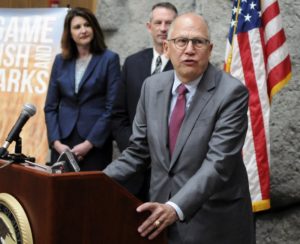
By Dana Hess
For the S.D. Newspaper Association
SIOUX FALLS — A group of newspaper journalists recently quizzed the attorney general candidates about government transparency issues and found both men open to considering changes to the laws that journalists find problematic.
Meeting with the two candidates – Republican Jason Ravnsborg and Democrat Randy Seiler – were members of the South Dakota Newspaper Association First Amendment Committee.
Both candidates were asked to use an A through F scale to grade South Dakota on its openness and transparency laws. The higher grade came from Ravnsborg, a Yankton attorney, who gave the state a B minus.
“We’ve got room for improvement,” Ravnsborg said, “but I don’t believe we’re as bad as a number of the surveys that have been pushed around the country showed.”
The grade from Seiler, a former U.S. Attorney, came in at a C minus.
During his campaign, Seiler said he has heard complaints about methamphetamine and opioid use, “but I also hear a lot about public corruption aspects, the obvious Mid-Central Cooperative and EB-5.”
Getting South Dakota’s grade up to an A, according to Ravnsborg, would take better transparency by the state’s Bar Association so that a list of lawyers who have been dis-ciplined is more readily accessible to the public.
“It is a public record, but there is no good list,” Ravnsborg said. “Why not make a list that’s all in one place?”
For Seiler, the road to an A grade goes through a review of public corruption statutes like those found in Initiated Measure 22 and a more transparent standard for involving South Dakota in other state’s lawsuits.
Seiler cited South Dakota’s role in lawsuits to overturn the pre-existing conditions provi-sion of the Affordable Care Act and an effort to find the Clean Water Act unconstitution-al.
“I don’t know what factors were made or taken into consideration in making that deci-sion,” Seiler said. “It obviously should not be political. There should be standards based on what’s in the best interest of the people of the state of South Dakota.”
The candidates were told about journalists’ frustration with abuse of the open meetings law, particularly the provisions that allow executive sessions for consulting with an attor-ney about litigation or discussing personnel matters.
Ravnsborg said he has heard the same complaints about local elected boards discuss-ing regular business during closed session.
“I don’t know that it’s always intentional,” Ravnsborg said. “I do think it’s probably small towns predominantly that don’t necessarily know the rules or aren’t getting the greatest legal advice.”
Seiler said he was familiar with local boards as a former Mobridge School Board mem-ber and as a former member of the Fort Pierre City Council. He has also filled in as Hughes County State’s Attorney.
“Just because they’re a lay board, they don’t get an exception for following the rule of law,” Seiler said. “Certainly that’s their obligation—to ensure they are familiar with and in compliance with the statute.”
Both candidates were open to considering the idea of having executive sessions rec-orded. In the event the legality of the meeting was challenged, the recording could be reviewed in a judge’s chambers.
A 2009 state law declaring a presumption of openness for government records came with more than 20 exceptions. One of the exceptions is government correspondence, including emails.
Ravnsborg said official documents should be open to the public. “Emails are problemat-ic,” Ravnsborg said. “They’re so quick.”
Seiler, too, was open to reviewing the exceptions.
“The presumption is that they are open, but then we’ve crafted all of these exceptions,” Seiler said. “We need to narrow those. We need to look at those.”
Both candidates favored treating as public records the confidentiality agreements in state lawsuits.
“I believe that agreements should be more open and transparent, especially when you’re involving tax dollars,” Ravnsborg said.
According to Seiler, confidentiality agreements aren’t allowed under any circumstances in lawsuits handled by the U.S. Attorney’s office.
“I can’t think of anything, right now, that should be an exception to that blanket rule,” Seiler said. “If you’re involved in litigation and you’re paying a settlement and you’re us-ing government money to pay the settlement or settle litigation, the public should have access to that.”
In South Dakota, law enforcement investigative records for closed and inactive cases as well as police reports generated by calls for service are not open records. Both candi-dates said they were open to reviewing that policy as well as reviewing the proper times to release 911 calls and body cam and dash cam videos. Both were open to expanding the release of booking photos to include high level misdemeanors.
If elected, both candidates said that creating more transparency in state government would start with the attorney general’s office.
In addition to setting standards for South Dakota’s involvement in litigation, Seiler said he would improve the online form citizens use to report consumer affairs abuses.
“Citizens should be able to have a very open access to the attorney general’s office on these issues,” Seiler said.
Ravnsborg said he would add transparency to the AG’s use of the Drug Control Fund. The fund comes from forfeitures in the state’s drug cases that are used to pay for grants to law enforcement agencies in the state.
“We’ll have more transparency on how the money comes in and how it’s granted out,” Ravnsborg said. “I would like to shine some light on the process.”
—
